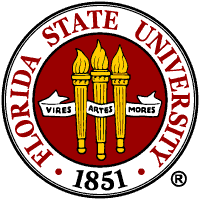
CHM 1020--Chemistry for Liberal Studies--Spring 2002
 |
|
|
CHM 1020--Chemistry for Liberal Studies--Spring 2002 |
|
|
CHM 1020-01 |
Course Syllabus |
Spring 2002 |
|
Course Title: |
Chemistry for Liberal Studies |
|
Class Hours: |
8:00-9:15 Tuesday and Thursday 255 Fisher Lecture Hall |
|
Instructor |
Robley J. Light Office: 204 DLC Phone: 644-3844 Email: rlight@garnet.acns.fsu.edu Office Hours: 2:00-3:00 pm M&W 9:30-10:30 am Tu&Th (or by appointment) |
|
Textbook: |
Suchocki, J., Conceptual Chemistry, Understanding Our World of Atoms and Molecules, Addison Wesley, 2001 |
|
Supplements: |
Blackboard Access Password (shrink wrapped with your book) CD-ROM package “Chemistry Alive” (If not available when you purchased the book, take your receipt to the bookstore to pick them up). |
Description:
This is a course for non-science majors who wish to fulfill a liberal studies science requirement with chemistry and plan to take no further chemistry courses. It is not a preparatory course for CHM 1045. It introduces basic concepts and principles as tools to understand the chemical make-up of the world around you, and how society is impacted by that chemical make-up. The approach is more conceptual than quantitative, and mathematics is minimized. Nevertheless, access to a calculator capable of calculating logarithms and exponential notation is required.
Web Enrichment:
Your textbook and the lectures will be supplemented by material on the web provided both by your textbook publisher and your instructor. Access to local web materials is through Blackboard. You must have a garnet or mailer account to access Blackboard. In addition, you will need an access code provided with your textbook in order to access some of the publisher’s materials on Blackboard, including the on-line web quizzes. Your textbook should also provide you with an access code to the publisher’s textbook web site, http://www.chemplace.com/college.
Chemistry Alive! Tutorials on CD-ROM
A set of CD-ROM tutorials comes with your textbook. Each chapter contains one or more short movies explaining some concepts in the chapter, along with a short quiz on the tutorial content. For extra credit (3 points per chapter), you can submit your answers to these short quizzes as evidence that you have completed a chapter tutorial.
Grading
The grade is based on three hour tests, a final, and the best 7 of 9 web tests as follows:
|
Item |
Points |
|
Hour Tests (100 points each): |
300 |
|
Average of 7 web quizzes |
100 |
|
Final Exam (100 x 2)* |
200 |
|
Total |
600 |
|
(Extra credit, tutorials, 10x3) |
(30) |
|
|
|
|
*Final exam score will replace a lower hour test or quiz average. |
|
The following are tentative percentage cut-offs for letter grades, obtained by dividing the total score by 6. These cut-offs might be adjusted downward slightly depending on difficulty of tests and overall class performance, but they will not be raised.
Students are expected to uphold the Academic Honor Code. The Academic Honor System of The Florida State University is based on the premise that each student has the responsibility to:
The full honor code is available at http://www.fsu.edu/~union/honor.htm.
ADA Requirements
Students with disabilities needing academic accommodations should:
1.Register with and provide documentation to the Student Disability Resource Center (SDRC).
2.Bring a letter to the instructor form the SDRC indicating you need academic accommodations. This should be done within the first week of class.
For more information about services available to FSU students with disabilities, contact the Assistant Dean of Students: sdrc@admin.fsu.edu, Disabled Student Services, 08 Kellum Hall, Florida State University, Tallahassee, FL 32306-4066, (850) 644-9566, or visit their website at http://www.fsu.edu/~staffair/dean/StudentDisability/index.html
|